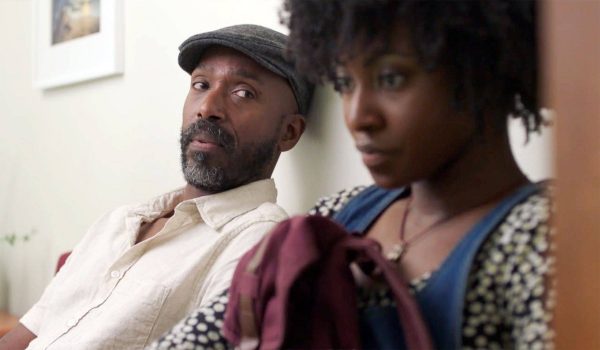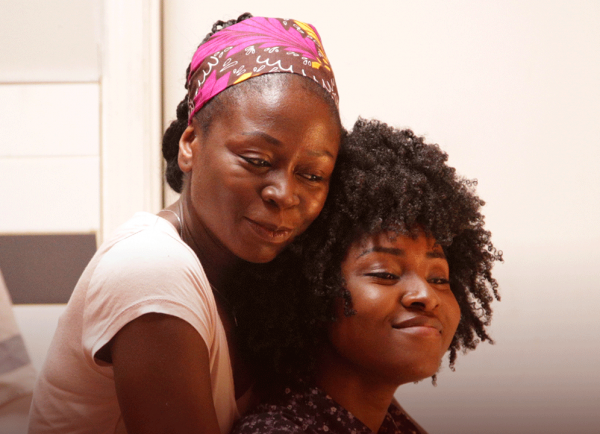
“Farewell Amor”(2020). Cast: Ntare Guma Mbaho Mwine, Zainab Jah, Jayme Lawson, Joie Lee, Nana Mensah, Marcus Scribner. Director: Ekwa Msangi. Screenplay: Ekwa Msangi. Web site. Trailer.
Our interpersonal relationships are among the most prized aspects of our lives. They’re cherished gifts to ourselves and to those we care about, and preserving them is of the utmost importance. But what happens when we drift apart, not necessarily because of intentionally malicious acts, tragedies or other negative influences, but simply because of circumstances brought about by the separation of time and distance. Can those connections be sustained or, if needed, rebuilt? That’s what a family must discover for itself in the moving new domestic drama, “Farewell Amor.”
After a 17-year separation, a family of Angolan immigrants is about to be reunited. Walter (Ntare Guma Mbaho Mwine), head of the household, has been living in New York after fleeing the decades-long political strife of his homeland. His wife, Esther (Zainab Jah), remained behind with their young daughter, Sylvia (Jayme Lawson), while he sought to make arrangements for them to come to the US. However, endless delays and red tape kept that from happening, eventually forcing Esther and Sylvia to relocate to Tanzania to seek safety while awaiting approval to join their husband and father.
While Walter and Esther appear to be happy to be reunited, 17 years is a long time to be separated. A lot can happen in that time, as is the case with this long-parted couple. They quickly discover that their reunion is an exercise in starting from scratch, getting to know one another all over again. And, then, of course, there’s Sylvia, who adds yet another dimension to this scenario. She was a mere child when Walter last saw her, and she doesn’t seem to be particularly thrilled to be in New York, separated from her friends and the people she grew up with in Africa. The family’s situation is thus akin to three strangers trying to make things work out together from square one.

As their saga unfolds, the film tells their story in three segments, one named for each of the protagonists. In the first, “Walter,” viewers learn how the one-time aspiring journalist gave up on his dream when he left Africa, taking a job as a cab driver once he arrived in New York. Through the years, he struggled to get by financially and to make arrangements for Esther and Sylvia to join him in America. However, after years of being on his own, and given the ongoing uncertainty that his family would ever be able to reunite with him, he began broadening his social and amorous interests. He eventually became involved in a new romance with a nurse, Linda (Nana Mensah), a relationship that he reluctantly had to dissolve when Esther and Sylvia arrived. But, despite their breakup, Walter’s feelings for Linda remain strong (and vice versa), especially when he sees that his compatibility with Esther is not what it once was. This is primarily due to Esther becoming a devout fundamentalist Christian during her 17 years in Africa, a transformation that she brought with her to America and that has manifested itself as a perpetual act of annoying, ever-self-righteous evangelizing. Needless to say, it’s a change that doesn’t suit Walter and doesn’t do much to help rekindle the romance in their increasingly rocky marriage.
The second segment, “Sylvia,” explores the difficult adjustment of Walter and Esther’s teenage daughter in her attempt to assimilate into a new life in New York. She’s often aloof and on her own. She misses her friends terribly. She’s frustrated by her mother’s meddling fundamentalist ways, most notably her restrictions on her behavior, particularly her love of dance. And, at least initially, she makes little effort to warm up to her father. But then she meets DJ (Marcus Scribner), a budding romantic interest who helps her reconnect with opportunities to express herself through dance. She also comes to realize that Walter is nothing like Esther, an understanding that helps to warm relations between them. But will she be allowed to truly be herself under these conditions? The growing disharmony in the household makes circumstances increasingly tense, too. Will she be able to make the adjustment she so desperately seeks to achieve?

The final segment, “Esther,” links the two previous sequences to the experiences of the third member of this domestic triad. Through a series of seemingly innocuous incidents, Esther begins to have suspicions about Walter’s infidelity, several of them unwittingly instigated by long-term neighbor Nzingha (Joie Lee). The street smart, plainspoken African mystic is aware of Walter’s history with Linda and does whatever she can to help Esther win back her man. However, in doing so, Nzingha candidly tells Esther what she needs to do to shape up if she hopes to save her marriage, offering advice that frequently takes her out of her sheltered religious bubble and encourages her to remove the blinders of naïveté that aren’t doing her any good. The question is, will she listen? And will it be enough to preserve her relationship and the sanctity of the family?
To get along best with others, it always helps to be authentic, a process that starts with being genuine within ourselves. This should seem obvious to most of us, because doing so presents us in our most sincere light. But, if we can’t, don’t or won’t operate from a sense of personal integrity, we should expect problems to arise, because the beliefs associated with that stance present a distorted view of who we are, a quality sure to show up in the reality surrounding us, including our relationships with others. Such is the result that comes from the conscious creation process, the philosophy that maintains we tap into these intangible resources to manifest our existence.
Our beliefs concerning our interpersonal relationships are often among the most fragile and the ones that can become most easily damaged if we discover that they don’t align with what we’re experiencing. For instance, Walter is less than honest about his romance with Linda. Sylvia is deceitful about her desire to pursue dancing opportunities despite her mother’s disapproval. And both of them clam up when it comes to their feelings about Esther’s incessant proselytizing. Meanwhile, Esther believes that both her husband and daughter are being completely truthful about themselves, lulling her into a false sense of security that’s shattered when evidence to the contrary begins surfacing. Is it any wonder that these disconnected beliefs lead to relationships fraught with difficulties?

In large part this occurs when co-creations such as this are fueled by beliefs that don’t jibe. The collaboration is tainted almost from the outset, and, as the scenario plays out, problematic relationships and realities result. This can be fixed by setting things right, of course, but that can be hard to achieve once the damage is done. The egg generally can’t be unscrambled.
That’s why it’s best to start out honestly to begin with. Even if the family has been separated for a long time, father, mother and daughter would serve themselves best by beginning with an unblemished slate, laying all their cards on the table. Of course, attempting this means getting real, eliminating pretense, taking off blinders and ridding oneself of wishful thinking. That’s likely going to be most difficult for Esther, who naïvely believes that her faith (or, more precisely, her religion, for the right price) will take care of everything for her to make matters right. It’s a belief she might want to revisit in light of her circumstances.
Because rebuilding family relationships is a joint effort, Walter, Esther and Sylvia need to work on their beliefs associated with developing connections with one another, something they generally haven’t had to contend with for 17 years. That can be difficult when current conditions don’t mesh with previous impressions. Walter, for example, is mystified by Esther’s religious preoccupation. Her constant obsessions with piety, holding “sinfulness” at bay and strict obedience to her calling have taken much of the everyday joy out of her life, one of the qualities that Walter adored about her. And, when she tries to instill comparable traits in him, he’s drawn aback; he still loves the aspects of daily living that Esther has somehow come to see as against God’s way. It’s no wonder he still feels drawn to Linda, because she provides him with a companion and conduit to the activities he continues to enjoy.
This consideration is also important to Walter and Sylvia, who have virtually no connection to one another when the story opens. Because he hasn’t seen his daughter since she was very young, he’s never had a chance to build much, if any, connection to her. Given that the only parent Sylvia has ever known is Esther, it’s understandable that she’s naturally cautious when it comes to dealing with Walter. What if he’s just like her mother? Then she would have doubly unbearable circumstances to deal with.

Fortunately, relations between Walter and Sylvia gradually warm, because they can see that they’re more on the same page than they thought when it comes to their beliefs. This takes some time, but patience truly is a virtue when it comes to forging bonds like this. To rebuild a workable relationship, this consideration will obviously need to be implemented where Walter and Esther are concerned. It will also be beneficial if Esther and Sylvia hope to improve their connection with one another.
Again, fortunately, there’s help to accomplish this, and Esther successfully manages to summon it to her when she needs it most. The advice and guidance provided by Nzingha proves invaluable, even if her straight-talking approach sometimes leads to statements that Esther would rather not hear. Nevertheless, such splashes of cold water are often necessary to rid ourselves of foolish notions and outmoded beliefs that no longer serve us, especially when there’s a lot on the line.
All of the foregoing measures help to strengthen the honesty and integrity that go into the beliefs we employ to make our relationships work. By embarking in a spirit of focused cooperation and collaboration, we can promote the development of healthy co-creative efforts. The question for Walter, Esther and Sylvia is, are they willing and able to make the effort? As noted earlier, this takes time and patience. For their sake, let’s hope they’re capable of devoting enough of both to achieve success.
The story in “Farewell Amor” may be a simple one, but it’s filled with heartfelt emotion on every front. The inventive storytelling approach employed in director Ekwa Msangi’s debut narrative feature incorporates details of the trio’s collective story in each segment that don’t appear in the preceding or following chapters, thus allowing the overall odyssey to be pieced together like a puzzle. By presenting the story in this way, viewers witness the bigger picture gradually come into view in much the same way that the protagonists do, a refreshingly revelatory storytelling experience. Admittedly, some of the material is somewhat predictable and more than a little bit sentimental, but these drawbacks are compensated for by fine performances, touching writing and a pervasive warmth, all aimed at shining a bright light on the experience of what it’s like to live under circumstances such as these. It’s an important message in a time like this, with so many from so many places living under similar conditions. In doing so, the picture illuminates the connections, challenges, hardships and reconciliations that those living out the immigrant experience go through and share with one another, no matter what their points of origin, ports of entry or hopes for the future may be. The film is available for streaming online.
“Farewell Amor” has received more than its fair share of praise from critics and at film festivals. It was also named one of 2020’s Top 10 Independent Films by the National Board of Review. And director Msangi was recently named the winner of the Someone To Watch Award in the Independent Spirit Awards competition, honors all well deserved.
Anything worth maintaining is worth fighting for. That’s particularly true when it comes to something as significant and meaningful as our relationships. But, if that’s to happen, we must believe in the possibility that they can be preserved and, if needed, redeemed. It may be tempting to give up when circumstances become difficult, but is such abandonment truly the wisest course, even if it’s perceived as being the easiest? One must look within when such situations arise with an open and honest heart to assess what we run the risk of losing before it’s too late.
Copyright © 2021, by Brent Marchant. All rights reserved.

No comments:
Post a Comment